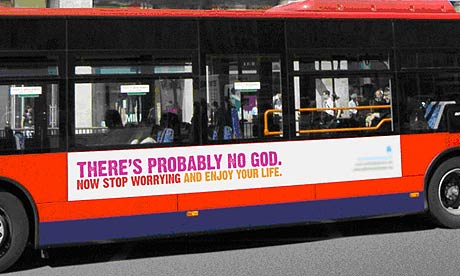Ed: Surely the Christian response to this bit of advertising should be, "If you think there's no god, you should be worrying, because any day now you're going to die."
And anyway, what's with "probably"? I thought this was an atheist campaign.

The godless move in mysterious ways: what the atheist bus campaign's advert will look like.
The atheist bus campaign launches today thanks to Comment is free readers. Because of your enthusiastic response to the idea of a reassuring God-free advert being used to counter religious advertising, the slogan "There's probably no God. Now stop worrying and enjoy your life" could now become an ad campaign on London buses – and leading secularists have jumped on board to help us raise the money.
The British Humanist Association will be administering all donations to the campaign, and Professor Richard Dawkins, bestselling author of The God Delusion, has generously agreed to match all contributions up to a maximum of £5,500, giving us a total of £11,000 if we raise the full amount. This will be enough to fund two sets of atheist adverts on 30 London buses for four weeks.
If the buses hit the road, this will be the UK's first ever atheist advertising campaign. It's an exciting development, which I never expected when I first proposed the idea on Cif in June. Back then, I was just keen to counter the religious ads running on public transport, which featured a URL to a website telling non-Christians they would spend "all eternity in torment in hell", burning in "a lake of fire". When I suggested the atheist counter-slogan (now shortened for readability), the response was extremely positive, and hundreds of you pledged your support after the follow-up article. Read more
No comments will be posted without a full name and location, see the policy.
2 comments:
They say "probably" for the same reason as Carlsburg, in order to meet advertising standards, as the existance or non-existance of God is unprovable
Hi anonymous (though why anonymous?) The problem with the probably is that it affects the second part of the slogan as well as the first: "There is probably no God. So you should probably stop worrying and enjoy life."
But then there is another problem. Why should the idea that there is no God mean that you should enjoy your life more than if there is? This is simply not discussed - but it ought to be.
Apparently there are plans for further campaigns along the lines of "You don't have to believe to be good." But you do - you have to believe that being good is, well, 'good'. And you then have to think about why the inanimate (blind, merciless, meaningless etc a la Dawkins) universe produces 'good' beings.
You can't just say, "No God. Enjoy!" Or rather, if you do, you have to allow that many people's response will be despair, and many others will, as we see weekly in our towns and cities, respond with selfish hedonism.
A last point. If we all (atheists and believers) know we should be good, and if we know what good is, why aren't we, and what does that make us?
Post a Comment